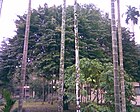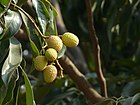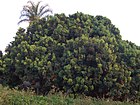Note: This is a project under development. The articles on this wiki are just being initiated and broadly incomplete. You can Help creating new pages.
Difference between revisions of "Litchi chinensis"
| (2 intermediate revisions by the same user not shown) | |||
| Line 1: | Line 1: | ||
[[File:Litchi chinensis 12zz.jpg|thumb|right]] | [[File:Litchi chinensis 12zz.jpg|thumb|right]] | ||
| + | '''Litchi chinensis''' is a slow-growing, very ornamental, evergreen tree with a dense, wide crow. It can grow 4 - 20 metres tall. The bole is short and stocky. A very popular fruit, especially in the Orient, where it is widely consumed. The tree has been cultivated for over 2,000 years. | ||
==Uses== | ==Uses== | ||
| − | {{Uses|}}, {{Uses|}}, {{Uses| | + | {{Uses|Diarrhoea}}, {{Uses|Neuralgic disorders}}, {{Uses|Orchitis}}.<ref name="Uses"/> |
==Parts Used== | ==Parts Used== | ||
| − | {{Parts Used| | + | {{Parts Used|Fruits}}. |
==Chemical Composition== | ==Chemical Composition== | ||
| Line 10: | Line 11: | ||
==Common names== | ==Common names== | ||
| − | {{Common names|sa=|en=|gu=|hi=|kn=|ks=|ml=|mr=|pa=|ta=|te=}} | + | {{Common names|sa=|en=Leechee, Lychee|gu=|hi=Lichi|kn=Lichi hannu|ks=|ml=|mr=Lichi|pa=|ta=|te=}} |
==Properties== | ==Properties== | ||
| Line 28: | Line 29: | ||
==Habit== | ==Habit== | ||
| − | {{Habit|}} | + | {{Habit|Evergreen tree}} |
==Identification== | ==Identification== | ||
| Line 47: | Line 48: | ||
==Mode of Propagation== | ==Mode of Propagation== | ||
| − | {{Propagation|}} | + | {{Propagation|Seeds}}, {{Propagation|Greenwood cuttings}}, {{Propagation|Grafting}}. |
==How to plant/cultivate== | ==How to plant/cultivate== | ||
| − | <ref name="How to plant/cultivate"/> | + | Litchi is adapted to the tropics and warm subtropics, producing best in regions with winters that are short, dry and cool but frost free, and summers that are long and hot with high rainfall.<ref name="How to plant/cultivate"/> |
==Commonly seen growing in areas== | ==Commonly seen growing in areas== | ||
| Line 67: | Line 68: | ||
<references> | <references> | ||
| − | <ref name="chemical composition">[ | + | <ref name="chemical composition">[Chemistry]</ref> |
| − | <ref name="Leaf">[ | + | <ref name="Leaf">[Morphology]</ref> |
| − | <ref name="How to plant/cultivate">[ | + | <ref name="How to plant/cultivate">[http://tropical.theferns.info/viewtropical.php?id=Litchi+chinensis Cultivation]</ref> |
<ref name="Uses">Indian Medicinal Plants by C.P.Khare</ref> | <ref name="Uses">Indian Medicinal Plants by C.P.Khare</ref> | ||
</references> | </references> | ||
==External Links== | ==External Links== | ||
| − | * [ ] | + | * [http://www.missouribotanicalgarden.org/PlantFinder/PlantFinderDetails.aspx?taxonid=286819 Litchi chinensis on missouribotanicalgarden.org] |
| − | * [ ] | + | * [https://www.sciencedirect.com/science/article/abs/pii/S0378874115301227 Litchi chinensis on sciencedirect.com] |
| − | + | ||
[[Category:Herbs]] | [[Category:Herbs]] | ||
[[Category:Pages without herbs images]] | [[Category:Pages without herbs images]] | ||
Latest revision as of 16:45, 4 June 2020
Litchi chinensis is a slow-growing, very ornamental, evergreen tree with a dense, wide crow. It can grow 4 - 20 metres tall. The bole is short and stocky. A very popular fruit, especially in the Orient, where it is widely consumed. The tree has been cultivated for over 2,000 years.
Contents
- 1 Uses
- 2 Parts Used
- 3 Chemical Composition
- 4 Common names
- 5 Properties
- 6 Habit
- 7 Identification
- 8 List of Ayurvedic medicine in which the herb is used
- 9 Where to get the saplings
- 10 Mode of Propagation
- 11 How to plant/cultivate
- 12 Commonly seen growing in areas
- 13 Photo Gallery
- 14 References
- 15 External Links
Uses
Diarrhoea, Neuralgic disorders, Orchitis.[1]
Parts Used
Chemical Composition
Common names
| Language | Common name |
|---|---|
| Kannada | Lichi hannu |
| Hindi | Lichi |
| Malayalam | |
| Tamil | |
| Telugu | |
| Marathi | Lichi |
| Gujarathi | |
| Punjabi | |
| Kashmiri | |
| Sanskrit | |
| English | Leechee, Lychee |
Properties
Reference: Dravya - Substance, Rasa - Taste, Guna - Qualities, Veerya - Potency, Vipaka - Post-digesion effect, Karma - Pharmacological activity, Prabhava - Therepeutics.
Dravya
Rasa
Guna
Veerya
Vipaka
Karma
Prabhava
Habit
Identification
Leaf
| Kind | Shape | Feature |
|---|---|---|
Flower
| Type | Size | Color and composition | Stamen | More information |
|---|---|---|---|---|
| {{{5}}} |
Fruit
| Type | Size | Mass | Appearance | Seeds | More information |
|---|---|---|---|---|---|
Other features
List of Ayurvedic medicine in which the herb is used
Where to get the saplings
Mode of Propagation
Seeds, Greenwood cuttings, Grafting.
How to plant/cultivate
Litchi is adapted to the tropics and warm subtropics, producing best in regions with winters that are short, dry and cool but frost free, and summers that are long and hot with high rainfall.[4]
Commonly seen growing in areas
[[:Category:Herbs that are commonly seen in the region of |]], [[:Category:Herbs that are commonly seen in the region of |]], [[:Category:Herbs that are commonly seen in the region of |]], [[:Category:Herbs that are commonly seen in the region of |]], [[:Category:Herbs that are commonly seen in the region of |]].
Photo Gallery
References
- ↑ Indian Medicinal Plants by C.P.Khare
- ↑ [Chemistry]
- ↑ [Morphology]
- ↑ Cultivation
External Links
- Ayurvedic Herbs known to be helpful to treat Diarrhoea
- Ayurvedic Herbs known to be helpful to treat Neuralgic disorders
- Ayurvedic Herbs known to be helpful to treat Orchitis
- Herbs with Fruits used in medicine
- Herbs with common name in Kannada
- Herbs with common name in Hindi
- Herbs with common name in Marathi
- Herbs with common name in English
- Habit - Evergreen tree
- Index of Plants which can be propagated by Seeds
- Index of Plants which can be propagated by Greenwood cuttings
- Index of Plants which can be propagated by Grafting
- Herbs that are commonly seen in the region of
- Herbs
- Pages without herbs images





